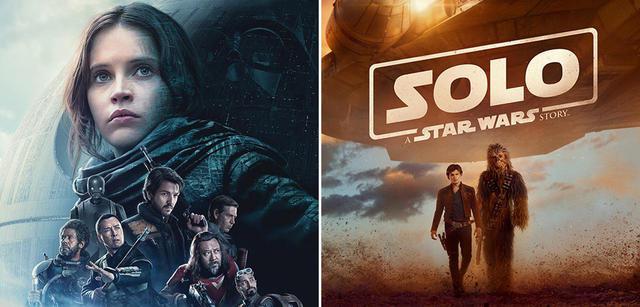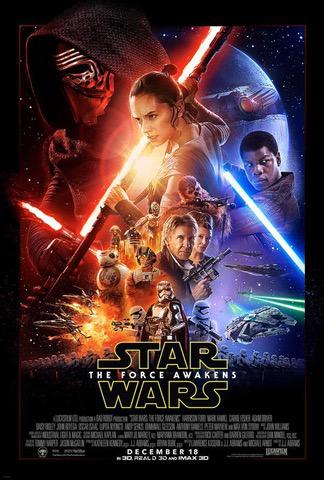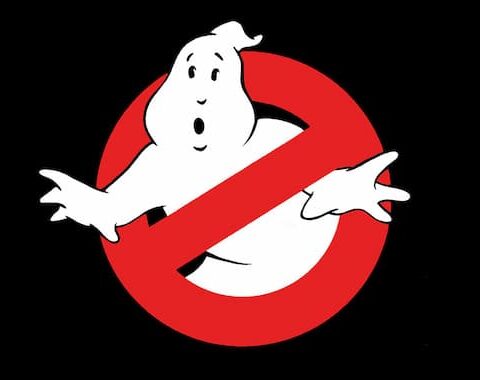Whether it’s the journey from Trevorrow‘s ‘Duel of the Fates’ to Abrams‘ ‘The Rise of Skywalker’ or the vetoed prospects of George Lucas‘s own Sequel Trilogy storyline, one thing is clear: the as-yet not-fully-told story of the Sequel Trilogy we didn’t get is almost as interesting as the actual films we did get.
It’s become clearer and clearer that a lot of the perceived ‘mess’ of the Sequel Trilogy in terms of its on-screen product is likely the result of things that were a ‘mess’ behind the scenes.
That the dynamics or the environment of what was going on away from prying eyes might’ve had a lot to do with how things turned out with the movies themselves.
It’s interesting to look at the blame game that gets played all over the Internet and social media all the time: with some people vilifying Lucasfilm head Kathleen Kennedy, for example, or some squarely blaming Rian Johnson for the ‘death’ of Star Wars, or with some blaming (and issuing death threats to) J.J Abrams for the perceived hatchet-job that some perceived The Rise of Skywalker to be.
The cruelty of some of this ‘backlash’ is another subject entirely – and yes, people are a-holes. Some of the vicious bile directed even at people like Daisy Ridley and Kelly Marie Tran is beyond the pale. But that’s a subject matter for another time.
In terms of where the ‘blame’ lies for the perceived problems in the Sequel Trilogy, I’ve never been convinced that it lies with any of the respective writers or filmmakers – neither with J.J, nor with Rian Johnson. I’m not convinced it lies with Kathleen Kennedy either: although I’ll grant that Kennedy can probably be criticised for not insisting on a three-film story plan from the start.
The reality seems to be that Lucasfilm and the various creative figures involved in this trilogy were being crippled by what I have to assume were Disney corporate demands. Bob Iger does not have a reputation as any kind of visionary: or as a particularly good patron to the creatives and their process.
He’s no Walt Disney – and he’s sure as hell no George Lucas.
Let’s look at even what we know about the behind-the-scenes conflicts – not even counting the various things that we don’t know.
We know, for example, that Lucas’s story treatments for the Sequel Trilogy were thrown out very quickly – even after Lucas and Bob Iger had apparently come to an agreement about *using* Lucas’s stories (Iger, who intends to run for US President some day, was open about this in his recent book – admitting that Lucas was extremely upset and had felt betrayed).
So, clearly there was a strained working environment and troubled dynamics from the very beginning.
We also know that Michael Arndt was the original screenwriter for TFA, but was fired.
And it has been reported that J.J Abrams himself had virtually begged for more time to work on The Force Awakens – but that Disney had forced him to finish the film according to their planned timetable so that they could get the film out for Christmas 2015. One has to assume J.J was not happy about it.
One also assumes J.J might’ve also been uncomfortable with Iger’s/Disney’s treatment of George Lucas: according to Iger’s book, Lucas wasn’t even aware that his story had been thrown out until he was literally sitting in a meeting with Abrams, Kennedy and others and suddenly realised that the story they were discussing wasn’t his one.
Rogue One then went through different writers and directors. As did Solo. And of course, Colin Trevorrow was the original writer intended for Episode IX, only to be replaced with J.J and Chris Terrio: at which point a completely different story was written to the one that Trevorrow had been developing.
It may even have been more complicated than that.
For months, the IMDB page for The Rise of Skywalker listed George Lucas as a writer – but this changed a few months before Episode IX‘s release. What happened there? Were the early rumours of Lucas working on the Episode IX story true or false?
Is there, as some people claim, a Lucas/Abrams version of the story out there somewhere – and did it get ditched?

Some observers noted the total absence of George Lucas from Episode IX events: he also didn’t attend the premiere, whereas Lucas did attend the premieres for the previous films. Was Lucas shafted again? Did he, at some point, contribute to some version of Episode IX story?
Furthermore, it was reported that extensive reshoots were still going on for Episode IX as late as one month before the film’s release. Clearly, someone – whether it was Abrams or Disney – was not happy with the film and was trying to make very late changes. It wouldn’t be surprising to learn that – as with TFA – Abrams was being put under tight conditions by Disney: perhaps again to meet that all-important Christmas release-date.
It wouldn’t be a shock if Abrams had again asked for more time, but been refused.
Claims are out there that Abrams wanted a three-hour film, but was refused it – even though Avengers: Endgame (with Marvel also owned by Disney) was given a full three hours.
Is there a three-hour J.J cut out there?
Could the ‘J.J Cut’ actually be a much better film? And if there was ever a ‘Lucas/Abrams’ version of the story, what was it and how much of it survived into The Rise of Skywalker?
I don’t know that we’ll ever get the answers to all these questions.
Someone should write a book one day, exposing all of this behind-the-scenes drama and conflict in the Sequel Trilogy. But what always emerges from the equation is the clear sense that this trilogy was rushed into production without a decisive story plan.
Way back in 2013, when Disney acquired Lucasfilm and almost immediately announced that Episode 7 was going to be released in December 2015 (less than two years away, at the time), I thought (and indeed wrote) that this sound extremely quick: to write, cast, plan, film, edit and post-produce something as monumental as a Star Wars film that quickly after the acquisition seemed unrealistic.
But clearly Disney wanted to get busy milking the cash-cow as quickly as possible – announcing that there would be a new Star Wars film every year for ten years.

Fast-forward a mere few years and suddenly all of that is in the toilet: the anthology film series is already history after only two films and, a mere four years after The Force Awakens, we were already being told the mainline Star Wars ‘saga’ was now being concluded for good.
Blaming Kathleen Kennedy – as so many commentators online seemed to – is probably misguided and unfair.
Kennedy is not a Disney executive: she is Lucasfilm. She is also a very experienced producer, who’s work goes all the way back to the first Indiana Jones movies, where she collaborated with the likes of George Lucas and Steven Spielberg. Kennedy’s strategy, near as I can tell, was to give filmmakers creative freedom and license with these films – first J.J and then Rian Johnson.
Presumably, she would’ve ascertained to her satisfaction that both Abrams and Johnson were not just highly talented filmmakers, but Star Wars fans who showed understanding of the saga.
Also, something that most of the ‘Fandom Menace’ always fails to acknowledge is that Kathleen Kennedy wasn’t put in charge of Lucasfilm by Disney: she was handpicked by George Lucas himself to head Lucasfilm – and this was some time prior to Lucasfilm being sold to Disney. The Fandom Menace likes to portray Kennedy as some kind of evil Disney interloper – but this is just flat-out incorrect.
It is far more likely that the problems and the interference was coming from Disney and not Kennedy or Lucasfilm: and that the pressures and restrictions being placed on various writers or directors – Abrams, Trevorrow, Arndt – might’ve created a very difficult or stifled creative environment.
Ironically the only writer or director who seemed to get a free pass without any controversy was Rian Johnson with The Last Jedi: and one suspects that, due to the backlash against TLJ, Disney went into panic mode and afforded far less freedom to Colin Trevorrow and then J.J Abrams.
From Kennedy’s perspective, a lot of her decision making for this trilogy makes sense. We talk about the lack of a plan; but there was at least one plan, which was to have the three main legacy characters get a film each to focus on them – Han in TFA, Luke in TLJ, and Leia in TROS. Carrie Fisher’s passing caused some problems with this strategy – at a point where TLJ had already been finished.
In that context, J.J did a really, really good job of managing to still give Leia a poignant final story in Episode IX.

Kennedy was smart to bring in Abrams to direct and co-write TFA: he’s a talented filmmaker and he’d already done a stellar job rebooting the Star Trek film franchise in 2009 and breathing new life into what was – at that time – a dead property. And he was a Star Wars fan; and often considered (rightly or wrongly) to be a modern-day Spielberg (recall too that Lucas himself had at one time wanted Spielberg to direct The Phantom Menace). And she was smart to bring in Lawrence Kasdan to co-write with Abrams – after all, Kasdan had co-written films in the Original Trilogy.
When it came to TLJ, I get the impression she was genuinely happy with what Rian Johnson was doing: and always knew that, even if some fans didn’t like it, there would be a different writer/director for Episode IX anyway. However, the scale of the backlash over TLJ probably took everyone by surprise – and this is probably where everything changed and where Disney probably exerted far more pressure or ‘damage control’ (especially after Solo underperformed at the box-office).
And this is presumably what led to Colin Trevorrow and his ideas being dropped.
As much as I have issues with The Rise of Skywalker, I suspect Abrams had a very difficult time trying to make that film: a film that was going to be extremely difficult anyway, but which was probably made even more difficult by corporate-level demands and interference.
The story that’s out there – and I don’t know if it’s true or not – is that the version of Episode IX that Abrams thought was going to be released (the one he wanted) was not the version that ended up in the cinemas: and that the cinematic release was actually something more like the ‘Iger Cut’.
I don’t know if this is true or not. But, given what we know about how George Lucas was treated right at the start of this trilogy’s creation, it wouldn’t be surprising to see J.J getting some shoddy treatment too.
The point could be made that all of this behind-the-scenes controversy, all of these hirings and firings, ditched stories and scripts, multiple versions, etc, are all part of the ugly reality of big-budget Hollywood filmmaking and corporate control.
Which actually highlights the value of what George Lucas was able to do in moving away from Hollywood, self-financing his films and setting up his own companies. You could argue back and forth about whether you like the prequels or not; but there wasn’t this level of conflict or bullshit going on behind-the-scenes when Lucasfilm was independent.
It all makes me wonder what would’ve happened if Lucas hadn’t sold to Disney, but had retained Lucasfilm: and then made the Sequel Trilogy purely under the Lucasfilm umbrella, but still utilising other writers and directors – even the exact same writers and directors. If Abrams and Kasdan had written TFA under Lucas and Johnson had written TLJ under Lucas, etc, how different would things be?
Or would that never have worked?
None of this is to say that the Sequel Trilogy is a ‘failure’ (as many claim it is). For all its flaws, there are things I love in each of these three films: and I can see myself rewatching and enjoying these movies for a long time to come, just as I do with the other two trilogies.
And certainly, it hasn’t been a commercial failure. All three films have grossed over a billion dollars, and The Force Awakens is still the biggest box-office hit of all time.
And there are lots and lots of people who’ve been enthralled by this trilogy, even with its shortcomings.
But when you hear about all these behind-the-scenes goings-on and questionable decisions and processes, you do get the impression that the creative forces involved in the storytelling and filmmaking did not have the freedom or the working environment that we’re led to believe they had.
And that had to have had something to do with how things have turned out.




